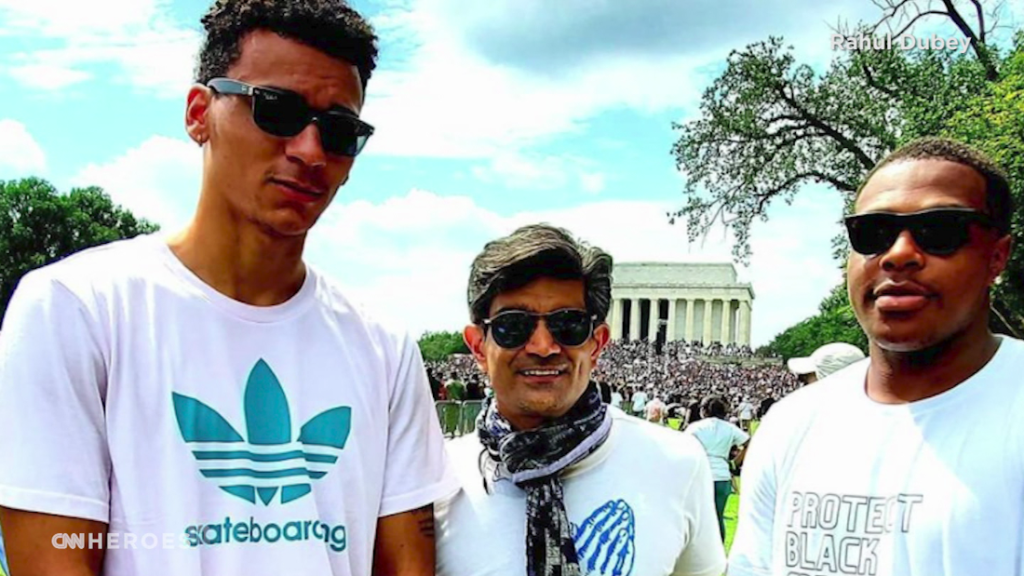Yet on June 1, 2020, when peaceful protesters were targeted by police in riot gear right outside of his home, Dubey gave them refuge — eventually sheltering 72 of the demonstrators overnight. His act of compassion ensured they all avoided arrest and made it home safely the next day. But the connections made that night have grown over the last 12 months and transformed lives, particularly Dubey’s.
“Bigotry, discrimination, racism, hate,” Dubey, 45, told CNN. “These are all counter-intuitive to what I believe in. And yet, I tolerated it.”
Dubey acknowledged that he had not attended organized protests in the past, even when he agreed with the cause.
“With Trayvon Martin, I would hear of these verdicts. And yeah, I would say to myself, ‘Oh my God, that’s terrible.’ And then I would get on my plane. I would book my meeting. I would still go to dinner,” he said.
But on the evening of June 1, in the middle of the Covid-19 pandemic, the protests arrived at Dubey’s front door. About a half hour before a citywide curfew went into effect, police drove protesters away from the White House. As the crowd dispersed, police sealed off streets and eventually corralled the demonstrators on Swann Street, where Dubey lived. There, hundreds of protesters were held, unable to leave.
“We’re basically like sardines in a little box,” recalled Garrett Reaves, a protester and Howard University student.
From inside his home, Dubey was monitoring the situation, which had become a tense standoff. Then, in a moment, everything changed.
“I guess someone gave an order, and they just started pushing us, spraying mace, trampling people, and then that’s when everybody started panicking,” Chukwuma “Meka” Enechionyia, a protester and Rollins College student, told CNN the next day.
Dubey made a split-second decision.
“You hear this loud bang. And I saw the clubs coming out and pepper spray flying everywhere. All I could do was just fling open the door. And I’m, like, ‘Get in the house!'” he said.
As pepper spray filled the air outside, dozens of protesters ran inside his home.
“They pepper sprayed into the house. It was chaos,” Reaves said. “People had milk and stuff and water to pour on people’s eyes.”
Dubey learned that rumors were circulating that the protesters had forced their way in. So, he and some of the protesters recorded videos together, proving to the world that they were invited guests.
When the curfew was lifted the next morning, the protesters emerged and Dubey was greeted with cheers from crowds that had gathered outside his home. The Metropolitan Police reported that 194 people had been arrested on Swann Street that night, although the DC Attorney General later declined to press charges against them. But the 72 individuals who sheltered with Dubey made it home without incident.
That could have been the end of the story. But since then, Dubey says he has remained in touch with dozens of the protesters, becoming extremely close with about 10 of them.
“I come over probably four times a week, talking business, politics. And we built so much just from everything that happened that night,” Meka said.
Dubey has supported Meka’s musical career by connecting him with friends in the entertainment business and helping him shoot two music videos.
“Rahul has been a big part of that,” Reaves said. “He’s a mentor and a friend as well … He has been one of the biggest blessings in my life.”
Last August, alongside some of the protesters he sheltered, Dubey attended a demonstration at the Lincoln Memorial for the anniversary of the 1963 March on Washington. He was excited to show his support for racial justice and equity, he said.
“It was such an honor for me to walk with these young men and women. … And so, this has sparked me to have the confidence and the compassion to say, ‘Okay, you know what? This is my fight.'”
Dubey is a first-generation American, whose father immigrated from India in 1967. He credits the civil rights movement led by Dr. Martin Luther King, Jr., John Lewis and many others for helping to pass legislation and change attitudes about racial equality.
Without their struggles, Dubey believes his father might not have come to the US and that his family’s experience in this country would have been much more difficult.
“For me, this was a tragically beautiful gift,” he said. “Prior to June 1st, I put my head in the sand. But to see the atrocities show up on your front door — If people like me don’t open the door, then really, who will?”
You may also like
-
Afghanistan: Civilian casualties hit record high amid US withdrawal, UN says
-
How Taiwan is trying to defend against a cyber ‘World War III’
-
Pandemic travel news this week: Quarantine escapes and airplane disguises
-
Why would anyone trust Brexit Britain again?
-
Black fungus: A second crisis is killing survivors of India’s worst Covid wave

